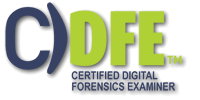MILE2 - CDFE 
The Certified Digital Forensics Examiner program is designed to train Cyber Crime and Fraud Investigators whereby students are taught electronic discovery and advanced investigation techniques. This course is essential to anyone encountering digital evidence while conducting an investigation.
Benefits Of This Course :
The C)DFE course will benefit organizations, individuals, government offices, and law enforcement agencies interested in pursuing litigation, proof of guilt, or corrective action based on digital evidence.
The C)DFE course will benefit organizations, individuals, government offices, and law enforcement agencies interested in pursuing litigation, proof of guilt, or corrective action based on digital evidence. An example of "corrective action" would be the termination of an employee for a violation of computer usage where digital evidence was needed to support the allegation. The investigator must furnish an irrefutable burden of proof based on that digital evidence. If not irrefutable, an attorney knowledgeable about Computer Forensics could have the case thrown out of court. Government or investigative agencies need proper training to succeed in cases like the above as well as those including acts of fraud, computer misuse, illegal pornography, counterfeiting, and so forth. Mile2's Certified Digital Forensics Examiner training teaches the methodology for conducting a computer forensic examination. Students will learn to use forensically sound investigative techniques in order to evaluate the scene, collect and document all relevant information, interview appropriate personnel, maintain chain-of-custody, and write a findings report.
WHAT DO STUDENTS LEARN?
The C)DFE training covers a wide range of topics including :
]Forensic Examination
]Tools of the trade
]Seizure Concepts
]Incident Investigation
]Fundamentals of conducting an effective computer forensic examination
]Electronic Discovery and Digital Evidence
WHO IS THIS COURSE FOR
Anyone who is or may be to be involved in examining electronic devices for digital artifacts (i.e. evidence) needed for company, legal, or law enforcement investigations.
OBJECTIVES COVERED IN LABORATORY SCENARIOS
Recovering electronically stored data for civil litigation
Recovering, categorizing and analyzing data
Hiding and discovering potential evidence
Investigating a misappropriations of proprietary information complaints
Bit-by-bit imaging digital media and preserving the integrity of the image
Identifying and reconstructing information within various file systems
Conducting an investigation into a complaint of sexual harassment
Understanding anti-forensics and steganography
Discover how a computer has been used and learn:
What websites have been visited?
What data has been deleted, and why?
What data is stored on the hard drive?
What e-mails have been sent and received?
Has data been copied off of the computer?
COURSE HISTORY
Computer Forensics as a field was born and developed by U.S. federal law enforcement agents during the mid to late 1980s. New techniques were needed to meet the challenges of white-collar crimes being committed with the assistance of a PC. By 1985 enforcement agents were being trained in the automated environment and by 1989 software and protocols were beginning to emerge in the discipline. mile2's originally had two forensics related courses: CFED (Computer Forensics and Electronic Discovery) and AFCT (Advanced Forensics Computer Techniques). These courses and related materials were created by practitioners in the forensics field. In 2008 CFED and AFCT were combined into the C)DFE course. Course content and materials are updated periodically to keep up with technology and concepts in the digital forensics field.
UPON COMPLETION
Certified Digital Forensics Examiner graduates obtain real world computer forensic knowledge that will help them recognize, seize, preserve and present digital evidence. Mile2's computer forensic graduates gain the skills and knowledge to perform forensically sound computer examinations and to clearly and accurately report on their findings. Students will also be able to confidently attempt mile2's Certified Digital Forensics Examiner certification exam.
Certified Digital Forensics Examiner Module Topics :
]Module 1: Introduction
]Module 2: Computer Forensic Incidents
]Module 3: Investigation Process
]Module 4: Disk Storage Concepts
]Module 5: Digital Acquisition & Analysis
]Module 6: Forensic Examination Protocols
]Module 7: Digital Evidence Protocols
]Module 8: CFI Theory
]Module 9: Digital Evidence Presentation
]Module 10: Computer Forensic Laboratory Protocols
]Module 11: Computer Forensic Processing Techniques
]Module 12: Digital Forensics Reporting
]Module 13: Specialized Artifact Recovery
]Module 14: e-Discovery and ESI
]Module 15: Cell Phone Forensics
]Module 16: USB Forensics
]Module 17: Incident Handling
]Appendix 1: PDA Forensics
]Appendix 2: Investigating Harassment
@ Register Now



